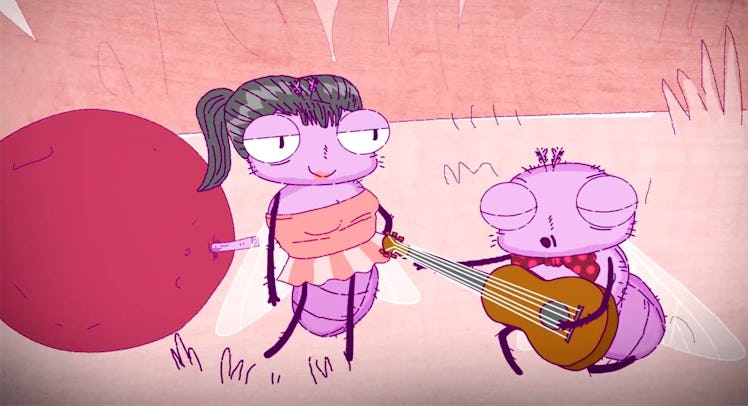Scientists Just Proved That Flies Enjoy Ejaculating
The findings are the first to definitively demonstrate that flies enjoy ejaculating, and may help us understand how the brain processes drugs and alcohol.

Flies—they’re just like us. Male fruit flies consider ejaculation a pleasurable experience, according new research in Current Biology. Scientists engineered male flies to experience the high of ejaculation when exposed to red light, and then demonstrated that sexually active flies and those buzzing about the lab’s red light district both refused to drink liquids spiked with alcohol. But control flies that were kept celibate hit the liquor hard. The findings are the first to show that flies enjoy ejaculating, and may help explain how the brain processes rewards from sex and drugs.
“We managed to show that the mating step that leads to pleasure in the brains of male fruit flies is the final step of copulation—the release of sperm and seminal fluid,” coauthor on the study Shir Zer-Krispil of Bar-Ilan University told Fatherly. “This is true also in the absence of a female, and prevents the need to seek for pleasure by other means such as alcohol consumption.”
Zer-Krispil and colleagues were not particularly surprised to find that flies like having sex. Who doesn’t? It has long been suspected that reproduction is pleasurable across many species, as an evolutionary incentive to reproduce. Besides, neurological studies and rats studies have strongly suggested that sexual reward is conserved across species, and isolated studies have shown that, when flies copulate successfully, they develop long-term positive memories and avoid alcohol.
But until now, it was unclear whether any one aspect of mating could activate the sexual reward centers in a fly’s brain. If a male fruit fly simply ejaculates (absent successful copulation) the researchers wondered, is the experience just as enjoyable? “Studies have previously shown that mating is perceived as rewarding for both flies and mammals,” Zer-Krispil says. “But we managed to uncouple the ejaculation from the other steps involved in copulation and demonstrated that ejaculation by itself can serve as an important part of the rewarding mechanism.”
Teasing out a solution to this question meant teasing a large sample of sexually frustrated flies. The researchers used optogenetics to engineer a cadre of flies to ejaculate when exposed to red light (for the armchair neuroscientists at home, they managed this by activating neurons to express the neuropeptide CRZ, which can trigger the release of sperm and seminal fluid even without sex). These flies predictably showed a strong preference for portions of the lab bathed in red light, confirming that they enjoyed ejaculating even when uncoupled from sex.
But then, the scientists added a twist. After exposing the engineered flies to a bunch of artificial ejaculation, they gave them a choice—normal liquid food, or liquid food spiked with alcohol. They also offered these meal options to flies that had copulated normally and flies that had not ejaculated at all. All sexually-active flies abstained. But celibate flies made a bee-line for the booze.
The findings are coup for the study of sperm and why male animals enjoy ejaculating. Along the way, the researchers identified brain circuits that link reward to social interaction, and discovered sensory mechanisms that tell the brain to active its reward system during sex. But there may even be implications for human addiction, outside of the lab. Scientists suspect that people living in low-reward states (whether that’s due to lack of sex or other sources of chronic stress) are more susceptible to drug addiction. This study, while conducted solely on flies and not generalizable to humans, may lay the groundwork for future research into why some people seem predisposed to addiction.
“The principles by which brain processes reward are much conserved among animals,” Zer-Krispil says. “Using fruit flies, we can study the interplay between natural and drug rewards and try to examine if an individual internal state can affect its motivation to consume drugs.”
This article was originally published on